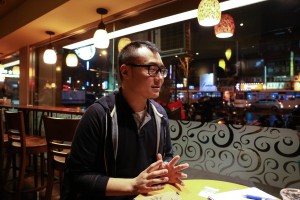
Another candidate, 33-year-old social worker Jennifer Lu, has been advocating for LGBT rights since her university days. She now has more than ten years of experience in social activism. Lu previously worked for the Taiwan Tongzhi Hotline Association, the oldest and largest non-profit organization in Taiwan serving the LGBT community.
“Since I grew up in a middle class family, I was raised in a sheltered environment. Participating in gay movements really broadened my exposure,” says Lu. Through participating in social movements, she met people from all walks of life, including gay men, transgendered people and members of the working class.
But over the years, Lu began to realize that all social movements would hit a bottleneck without change in Taiwan’s political environment. “People at the Legislative Yuan don’t understand what you are talking about. They do not realize that their views are very different from the actual challenges the people face. If we don’t change Taiwan’s top-down and money-oriented political environment, any social movement for the minorities cannot make progress,” says Lu.
She decided to run for parliament to help effect that change. “The gay community needs to participate in politics to influence politics. This also makes society realize we are part of the civil society,” Lu explains. “Taiwanese do not hate homosexuals, but they lack understanding of them.”

To drive home the point, Lu married her long-term girlfriend in a huge, traditional wedding banquet, held at a public square at the Xinyi district in Taipei, as part of her election campaign. “I wouldn’t hold such a huge wedding if I were not running for election, as rituals do not really matter to me and my partner. But I want to show the society the real life of homosexuals through an open, traditional wedding. There’s no difference from any other weddings, except there are two cute drag queens (entertaining party-goers).”
Although the Green-SDP Alliance failed to win enough votes to secure any parliamentary seats, this year’s election also saw a growing number of candidates from other parties who have publicly endorsed same-sex marriage.
Still, Eagle Kuo, a gay postgraduate student, thinks many politicians may claim to support marriage equality while not having a deep understanding of the issues. “Some organisations claim to be gay friendly…but when they talk about Ma Ying-jeou, they would say he is “blowing China’s trumpet”,” says Kuo. “Why do you vilify politicians you don’t like, by saying they are homosexual or effeminate? By doing this, you are actually stigmatizing homosexuals.”
Kuo says citizens have a responsibility to hold politicians accountable. “Whether it’s the KMT or DPP, if somebody claims (to support marriage equality), we cannot simply think they are sincere and therefore relax. We need to monitor them.”

He also feels that marriage equality has dominated public discussion at the expense of other issues related to sexual minorities and gender. “Marriage equality is very easily discussed. But other issues therefore become marginalized,” says Kuo. He cites HIV/Aids and sex workers’ rights as examples.
As a teenager, Kuo experienced discrimination at school when rumours about his sexual orientation spread. He pretended to be straight and saw his efforts pay off as he regained his friends. But he was miserable, knowing that friends liked him for someone he was only pretending to be. It was only after he graduated that Kuo was able to come out to a close friend.
For Kuo, education is more pressing and important than legislation. “Even if same-sex marriage (legislation) is passed, if discrimination still exists in the society, there will still be homosexuals who do not dare get married. They will still be afraid of societal pressure and cannot be themselves.”














































I think that the household registration system is the path forward. Taipei, Kaohsiung, Taichung, and (since last week) Tainan and New Taipei, have all launched household registration. The roots of a national system have already started with Taipei and Kaohsiung announcing that they’ll share their registration systems with each other and with whichever cities wish to join. Taoyuan is also open to it.
This means that all of Taiwan’s special municipalities (the largest cities) are or will be registering same-sex households for medical and other purposes and will share those registrations with each other. That’s the national system that will make its way to other provincial cities and counties. And it’s all happening even before Tsai and the DPP majority take office.